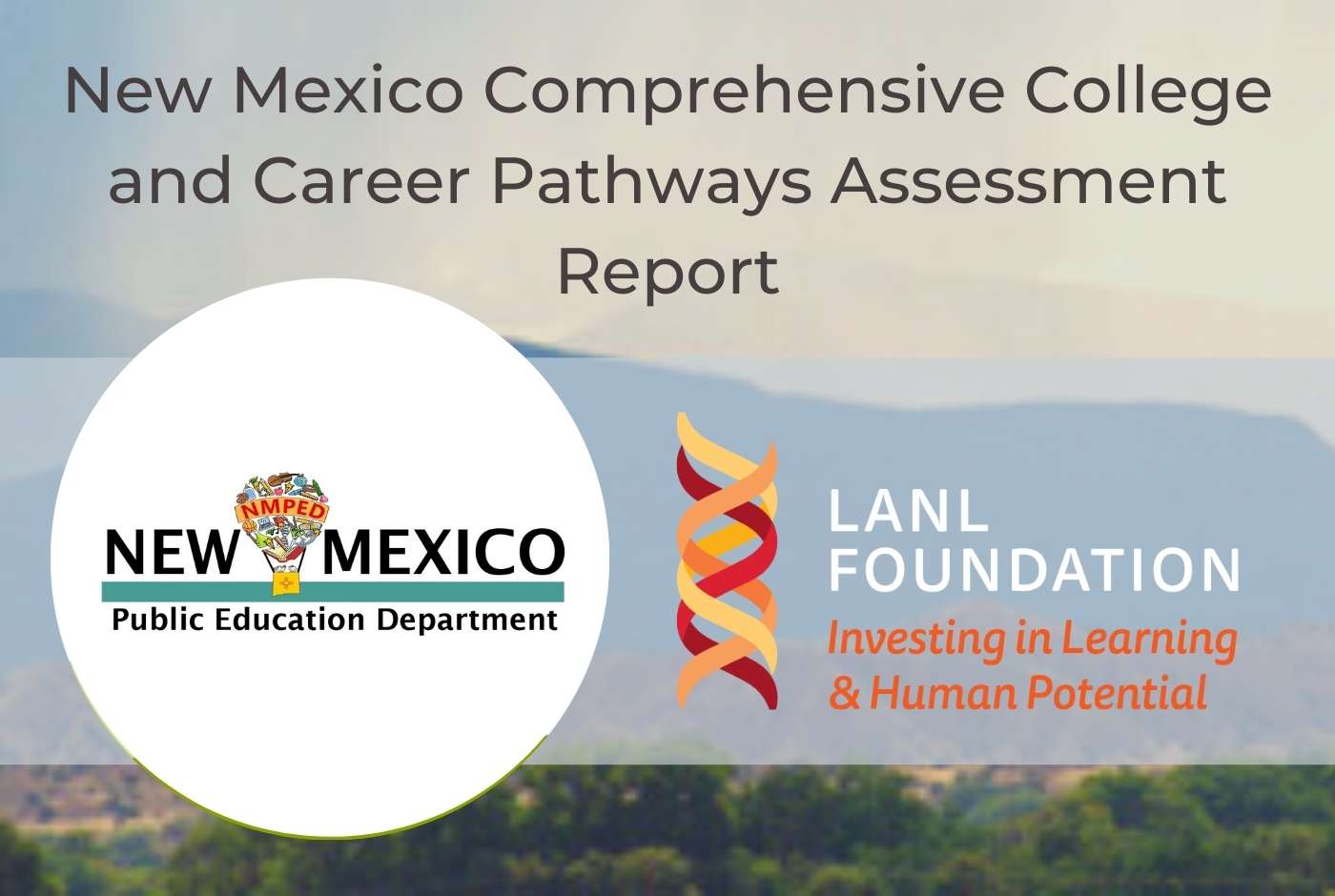New research, investments target career-based learning
SANTA FE — New Mexico is well positioned to transform the high school experience and high school outcomes with a game-changing expansion of educational pathways to college and career, according to a report released today by the New Mexico Public Education Department and the Los Alamos National Laboratory Foundation.
The New Mexico Comprehensive College and Career Pathways Assessment Report (attached) highlights innovative practices already occurring in New Mexico schools and recommends parallel and interconnected actions that schools, districts, tribes and the state should take to expand these practices statewide.
Doing so would address college and career readiness requirements from the district court ruling in the Martinez and Yazzie Consolidated Lawsuit, which demanded improvements to public education in New Mexico, particularly for low-income students, Native American students, English-language learners, and students with disabilities.
Jointly, the Public Education Department and Los Alamos National Laboratory Foundation commissioned the report to identify and assess college and career readiness initiatives that have been implemented by schools, communities, the state, and tribes.
“What New Mexico needs is an all-embracing strategy that weaves together promising local college and career-readiness practices that can be scaled up to every school,” Public Education Secretary Kurt Steinhaus said.
The report recommends how schools and districts across New Mexico can pursue a comprehensive, three-pronged strategy to support college and career pathways for all students:
Career Technical Education must be incorporated into core academics – math, science and social studies, for example – so every student has access.
Every student must have access to work-based learning through internships and apprenticeships arranged by their schools through partnerships with employers. The result would be students graduating with both work experience and contacts.
Every student must receive personalized support with attention to college and career advising and accelerated instruction in reading, writing and math.
“New Mexico is already doing some of these things and doing them well. But we know that when schools do all of these things together, graduation rates increase and college attendance rates increase,” said Alvin Warren, vice president of Career Pathways and Advocacy for the Los Alamos National Laboratory Foundation, a partner with the PED in funding the report.
Ultimately, the report recommends a four-year pilot program to expand comprehensive college and career pathways, building on strengths already present in the state. Results of the pilot would guide the design of a statewide plan that shifts how education agencies and schools approach college and career preparation and ultimately how students are supported throughout their education journey.
The findings come as the New Mexico Legislature is considering a new $10 million investment in high school transformation through expanded Career and Technical Education.
This funding for the Public Education Department’s CTE initiatives would provide direct support to districts, state charters and Bureau of Indian Education-funded high schools to implement career awareness and preparation programs. The goal is to give every New Mexico high school student access to rigorous, industry-aligned Career and Technical Education and workplace experience.
More than 75% of New Mexico students who are involved in Career Technical Education are low income.
The funding request is included in the massive appropriations bill approved by the House of Representatives last week and now before the Senate.
New Mexico began supporting CTE in earnest in FY21 by launching the Next Gen CTE initiative with nearly $500,000 to support programs that build employability skills. FY21 funding also allowed 13 districts and charters to add career exploration programs. The FY23 request now before the Legislature would allow expansion to additional schools, support the report’s recommended pilot program, launch new programs of study and expand career exploration programs to reach more middle school students.
Prior to the state offering funding, only 22 districts were offering federally funded CTE. In 2021-22, state Next Gen CTE funds support 71 districts and 32 charters. Together, they offered 54 programs of study in 11 industry clusters.
The report highlights the valuable lessons learned and progress made from successful college and career readiness initiatives already under way in New Mexico, including:
Advancement Via Individual Determination (AVID)
Blended School Year programs
Career and Technical Student Organizations (CTSO)
College Horizons’ readiness programs
Early College High Schools
High School Redesign Network
High Schools That Work (HSTW) (Southern Regional Education Board)
Jobs for America’s Graduates (JAG)
Leadership Schools Network
Linked Learning / Comprehensive College and Career Pathways
Native American Community Academy (NACA) Inspired Schools Network
New Mexico Work-Based Learning Initiative (WBLI-PED)
Next Gen CTE Initiative
New Mexico Regional Education Cooperatives (REC)
It also highlights several communities and schools doing this work, including Health Leadership High School in Albuquerque, where every course offering has a college and career-readiness angle.
“Preparing future young leaders for life after graduation and post-secondary opportunities requires that educators think beyond traditional strategies of instruction,” said Leticia Archuleta, executive director at Health Leadership High School. “The New Mexico Comprehensive College and Career Pathways highlight these efforts and learning opportunities for our unique communities throughout the state.”
Read the full report here.
